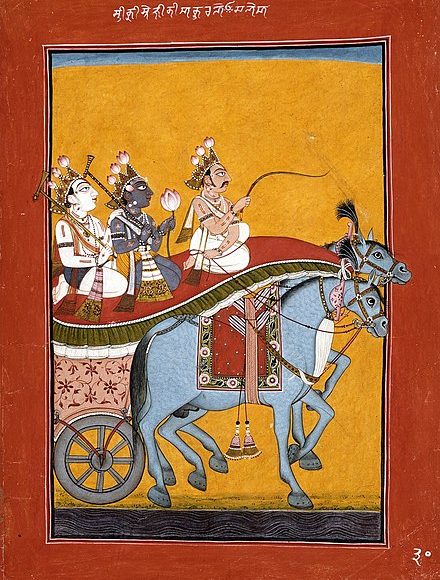AKRURA Oodho, Akrura (of the Dwapara age) and Trilochan, Namdev and Kabir (of Iron age) got their sins effaced by remembering the Name of the Lord and the same undeceivable Name, which ferries the saints across the world-ocean, came into the mind of Guru Amar Das. (Swayye Mahle Teeje Ke, p. 1393) Akrura was an uncle of Sri Krishna and also his faithful ally and well-wisher. When Kansa planned to kili Krishna and Balabhadra, he conducted a festival. Akrura was sent by Kansa to bring the two brothers for the festival. He understood the plot and informed Krishna about it. He also advised Krishna to kill Kansa.
Akrura fought against Jarasandha on the side of Krishna. He became famous as a commander of Yadava army. On another occasion, he was sent by Krishna, Balabhadra and Oodho to get tidings about Kunti and the Pandavas from Hastinapur. Being a great devotee of the Lord, he achieved salvation.
References :
1. Kohli, Surindar Singh, Dictionary of Mythological References in Guru Granth Sahib, 1993
Akrura, an uncle of Sri Krishna, is celebrated in Hindu epics as a faithful ally and well-wisher of Krishna. His actions during pivotal moments in the Dwapara Yuga highlight his unwavering devotion to the divine. When Kansa, the tyrant king, plotted to kill Krishna and Balabhadra through a festival, Akrura was sent to summon the brothers. Recognizing Kansa’s scheme, Akrura informed Krishna and advised him to confront and defeat Kansa, ensuring the restoration of righteousness.
Akrura’s devotion extended beyond loyalty to Krishna. He fought alongside him against enemies such as Jarasandha and played key roles in various missions, including delivering messages to Kunti and the Pandavas in Hastinapur. His life, marked by service and unwavering faith, made him a symbol of divine grace and dedication. Ultimately, Akrura’s deep devotion led him to achieve salvation, a theme celebrated in various spiritual contexts.
In the Guru Granth Sahib, Akrura’s name appears in conjunction with other renowned devotees such as Uddhava, Namdev, and Kabir. Their narratives are invoked to emphasize the transformative power of meditating on the divine Name (Naam). The scripture highlights that through the remembrance of the undeceivable Name of the Lord, even those weighed down by sins can find liberation. Guru Amar Das Ji reflects on the same divine Name that guided saints and devotees like Akrura to transcend the worldly ocean.







